“Neo-Victorian boom.” An expression that started to appear around a year ago is becoming something of a feature in writing about the city of London. The FT have gushed about “the world's leading city” as if it were an official contest or accolade, a recent issue of the Economist showed London at dusk, above a headline of “precarious brilliance". So long as the Olympics go off without too many G4S-style glitches, it’s hard to imagine them not strengthening the modern myth that London is developing for itself. Neo-Victorian boom. Apparently.
Look a little closer and all is not so well. In ever more bars, cafes and clubs you find increasingly stern advice to watch your belongings and use the bag hooks… thieves, it would seem, are operating in more and more areas of a city with the highest rate of wealth inequality in the developed world. Boris Johnson, newly returned as Mayor by only 15% of the total electorate, was last month tending to self-promotion in New York, loudly repeating his old pledge that London will not be sterilised. As still more private sector developments lay claim to public space, each with a now-familiar range of prefabricated franchises, Johnson seems to have confused an opposition to sterilisation with affection for London’s stunning inequality.
In all this, there’s an awful lot of newspeak to cut through for those who want the truth. The now well-heeled borough of Hackney was recently celebrating a reduced rate of poverty amongst its residents. The town hall is quieter about the likelihood that this has been caused by a displacement of poor residents who can no longer afford to live in the borough. Across the city the boast of “recession proof” continues to linger like a bad smell. London property prices have indeed remained buoyant, but it’s a moot point that a 7% climb in areas like Marylebone have been enough to bury the stutters in the likes of Dagenham and Romford, London’s emerging banlieu.
The Shard has become a newly popular metaphor for this gulf. London’s latest tallest building waits impatiently for its insides to be wired up, towering over the once low-profile south bank as it does so. Qatari-owned, the Shard has come to represent not only the brash arrogance of the financial sector, but also a tendency towards a city owned by those far away, people whose only concern for London is as an enduring cash cow. The most telling thing, in both name and design, is that the Shard seems remarkably comfortable in appearing outwardly mean. Cycle safety campaigners have highlighted the staggering rate of casualties caused by the Shard’s endless construction traffic, Simon Jenkins fumed that the Shard "has slashed the face of London for ever.'' Mercifully… “forever” is a long time, as is evident in the crumbling ruins of London Wall, the last Roman infrastructure project, completed in the second century to hem-in the city. The wall's ivy-strewn remains are a heart warming evidence that empires bigger than the Qataris have come and gone, together with their monuments... but still… it’s worrying when you have to find comfort through such a long view of history.
In short… and what I’ve been meaning to say all along… is that that it’s time for me to leave. I’ve always traveled by bicycle… around London, around the world, and a handful of times across Europe. It’s across Europe that I’m escaping this time, a ride of some 2500 miles to Istanbul, a route that I last took as a new graduate five years ago. With a financial crisis and a eurozone crisis separating now from then, I’ll go back to my familiar politics by bicycle, slow travel through nations that still wait to either enter or exit the European club, or who try to beat a new path inside of it. As the UK’s attention turns from Leveson and a corrupt media, and looks anew at Libor, HSBC, and a corrupt banking system, I pack my panniers and pump up my tyres, and return to watching Europe from the vantage point of a beat-up, leather saddle.


No comments:
Post a Comment